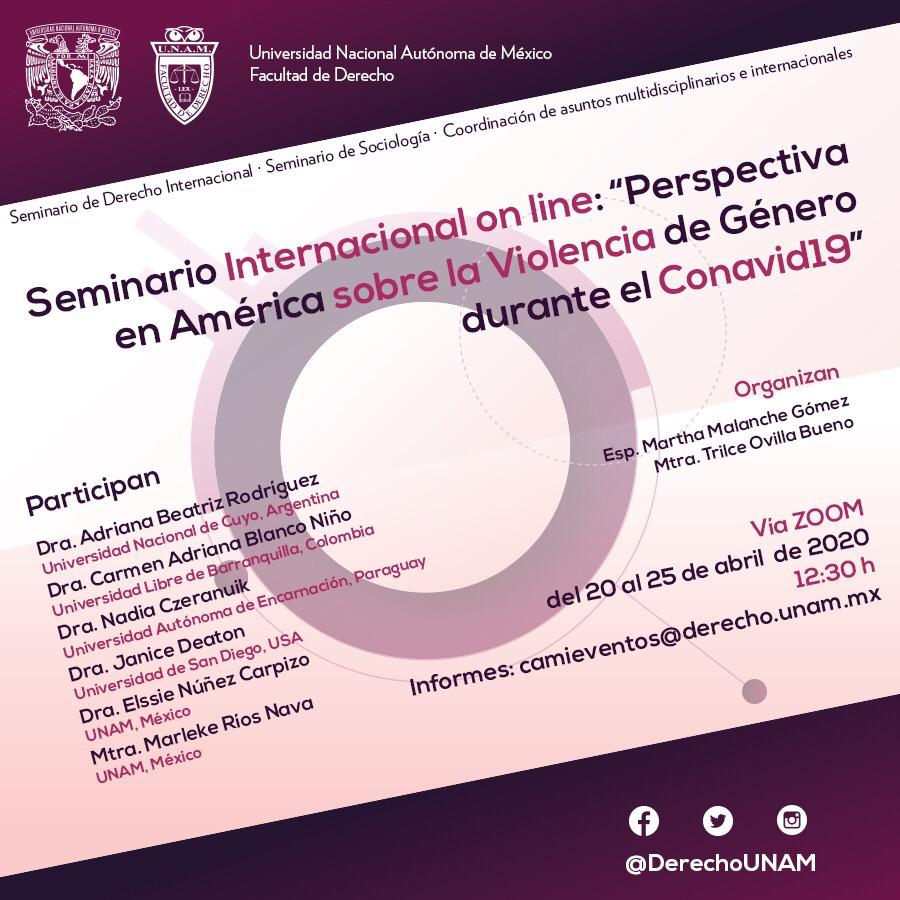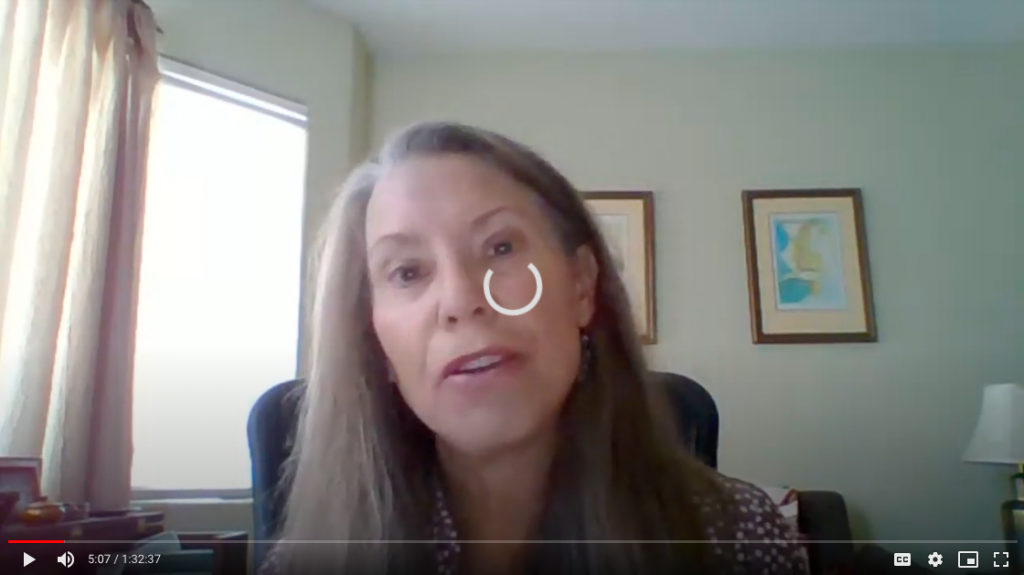
The Universidad Nacional Autonoma de México (UNAM) recently presented an online international seminar on the impact of home quarantines throughout the Americas on gender and domestic violence. The organizers invited two members of the OASIS team to present on gender violence in their countries: Janice Deaton, the Training Course Director at Justice in Mexico’s OASIS project, and Carmen Adriana Blanco Niño, an OASIS instructor from Barranquilla, Colombia. The seminar, “Perspectives in the Americas on Domestic Violence during COVID-19,” was held from April 20 through April 25, 2020, and was organized by UNAM professors Martha Malanche Gómez and Trilce Fabiola Ovilla Bueno.
Justice in Mexico’s collaboration with UNAM dates back to 2015 when UNAM hosted OASIS oral advocacy workshops. Trilce Ovilla Bueno was a participant in OASIS’s first trial skills workshop at UNAM, and in 2015, she participated in a study trip to San Diego and USD, where she and other outstanding OASIS participants from UNAM learned about the American justice system. Ms. Ovilla’s involvement with OASIS has continued since that time.
The Online Seminar
The seminar began with welcoming remarks from the Director of the Facultad de Derecho, Dr. Raúl Contreras Bustamante. Dr. Contreras was followed by UNAM Professor Marleke Ríos Nava, who gave the first presentation on an international overview of gender violence. She was followed by all-female presenters from Argentina, Colombia, Paraguay, the United States, and Mexico, who discussed domestic and gender violence in their respective countries during the COVID 19 crisis.
Domestic Violence Around the World
Professor Ríos Nava provided an overview of gender violence around the world and explained the international regulation of women’s rights and gender violence. Professor Ríos argued the most important treaty in women’s rights is the Convention on the Elimination of all Forms of Discrimination Against Women (CEDAW), which has been signed but not ratified by the United States. Professor Ríos discussed the global rise in gender violence cases resulting from the COVID 19 pandemic and concluded by discussing various resources for victims of gender or domestic violence.
Gender Violence in Argentina
Dr. Adriana Beatriz Rodríguez discussed gender violence in Argentina. Dr. Rodríguez, who teaches social work at the Universidad Nacional de Cuyo, in Argentina, focused on the concerning factors brought on by the pandemic that tend to increase gender violence and domestic violence. She mentioned the home confinement and resultant inability to ask for help, as well as the other stressors brought on by the economic crisis surrounding the pandemic.
Domestic violence in Colombia
OASIS instructor Carmen Adriana Blanco Niño spoke on domestic violence in Colombia. Ms. Blanco has been a trial skills instructor with OASIS since its beginning in 2015 and is from the Universidad Libre de Barranquilla, Colombia.
Ms. Blanco likewise discussed the worrying conditions of confinement due to the virus, as well as the increase in alcohol consumption in Colombia during the pandemic. Ms. Blanco highlighted the correlation between heavy alcohol use and intimate partner violence. She provided statistics as well as resources for people suffering from gender violence.
Domestic violence in Paraguay
Dra. Nadia Czeranuik is from the Universidad Autónoma de Encarnación, Paraguay, where she teaches education and also teaches school to young children. Dr. Czeranuik addressed the problem of violence at the university level. There was also a discussion on the challenges when a teacher suspects a student is involved in gender violence. Dr. Czeranuik emphasized the importance of educating young children with appropriate gender values.
Domestic violence in Mexico
Dr. Elssie Núñez Carpizo, a law professor from UNAM, presented on gender violence in Mexico during COVID 19. Dr. Núñez, who specializes in law and sociology, concurred with the other speakers that the COVID 19 virus and the resulting safety measures have increased incidents of gender violence in Mexico. Dr. Núñez also provided resources for further learning.
Domestic violence in the United States

Ms. Deaton focused on Intimate Partner Violence (IPV) in the United States. She began by providing the results from the 2018 Thomas Reuters Foundation Perception Poll, which places the United States in the top ten most dangerous countries in the world according to global experts on women’s issues. Access the survey here. http://poll2018.trust.org/
Ms. Deaton then looked specifically at Intimate Partner Violence (IPV) in the United States. As she explained, the United States Center for Disease Control and Prevention (CDC) has declared Domestic Violence or Intimate Partner Violence a public health problem. According to the CDC, about 1 in 4 women and nearly 1 in 10 men have experienced contact sexual violence, physical violence, and/or stalking by an intimate partner during their lifetime and reported some form of IPV-related impact. Regarding non-physical violence, over 43 million women and 38 million men experienced psychological aggression by an intimate partner in their lifetime. Ms. Deaton commented on factors that increase the risk for perpetration and victimization of IPV, according to the CDC.
The CDC’s report can be found here: https://www.cdc.gov/violenceprevention/pdf/ipv-technicalpackages.pdf
Sexual Violence on University Campuses
Next, Ms. Deaton discussed the issue of sexual violence on American university campuses. In 2012 and 2019, the American Association of University Professors conducted surveys that showed a quarter of undergraduate women at the schools reported nonconsensual sexual contact.
The report can be found here: https://www.aau.edu/sites/default/files/AAU-Files/Key-Issues/Campus Safety/Revised%20Aggregate%20report%20%20and%20appendices%201-7_(01-16-2020_FINAL).pdf
Response to Sexual Assault and IPV in the United States
Ms. Deaton listed some of the recent public responses to sexual violence, including the #MeToo movement. This movement has highlighted the prevalence of sexual assault throughout the country and in 2017, five of the “Silence Breakers” leading the #MeToo movement were named Time Magazine’s “Person of the Year.” There have recently been several high-profile sexual assault trials where famous celebrities have been convicted.
Intimate Partner Violence During COVID 19
With this background, Ms. Deaton explained the United States is confronting many of the same pandemic-related challenges as Argentina, Colombia, Paraguay, and Mexico. That is, the statistics she presented showed an approximate 25% increase in reports of IPV since the quarantine or home confinement restrictions were imposed in mid to late-March, 2020. Ms. Deaton reported that there are resources for victims of IPV, however, the conditions of confinement make reporting difficult since victims cannot get away from their abusers. Ms. Deaton concluded by providing a list of resources for more information.
Conclusion
UNAM presented a very interesting international seminar on a compelling subject: gender violence and the impact of COVID 19. Over 180 participants attended the week-long online seminar, from various Latin American countries as well as Spain. The all-female cast of presenters are experts in law or sociology and gave similar perspectives of a problem that is all too common in each country.
Works Cited
Anderson, Nick, et al. “Survey finds evidence of widespread sexual violence at 33 universities.” Washington Post. October 15, 2019.
“The world’s most dangerous countries for women.” Thomas Reuters Foundation. 2018.
Lumborg, Bjorn, and Michelle A. Williams. “The Cost of Domestic Violence is Astonishing.” The Washington Post. February 22, 2018.
Filipovic, Jill. “The Silence Breakers: Time Magazine’s Person of the Year.” Time. December, 2017
“Campus Sexual Assault: Suggested Policies and Procedures.” American Association of University Professors. October, 2012.




